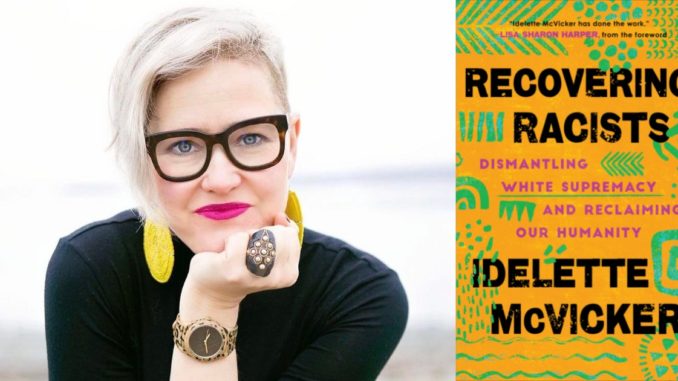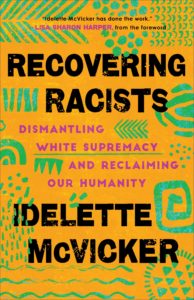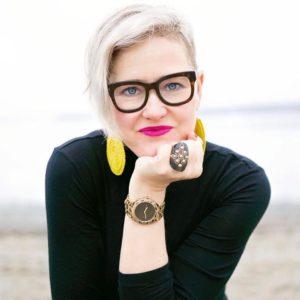
Podcast (beyond-the-page): Play in new window | Download
Subscribe: Apple Podcasts | RSS
From the first pages of Recovering Racists, I was transfixed by Idelette McVicker’s authenticity and vulnerability as she shared about the liberating nature of declaring oneself a recovering racist. Her book is mind-opening and paradigm-shifting for those desiring to truly do the work of reconciliation.
The Conversation | Idelette McVicker
This excerpt may be edited for conciseness and clarity. For the whole interview, see the audio player above or visit us wherever you get your podcasts.
Josh Olds: Tell me about your journey in being a recovering racist.
Idelette McVicker: In some way, I was born into the story, right? Like, I write about that, but just to be born right into the story of apartheid in South Africa. I was born into the white side, literally the white side, of the hospital and my birth certificate was stamped with a racial declaration that was created by the apartheid government, which was a violence in itself. And so for me, this race consciousness was there. Right? Like, it wasn’t spoken about by white people, but it was there. So I can say it started in my birth. Or I can say it started when I was 16 when I, at that time books were starting to get unbanned in South Africa, and I remember walking into the library, and I’m like, “Banned books? Can they be so bad?”…And I remember I just kind of went for that turnstile…I started reading this book and it was describing a relationship with a white man and a black man in a way that I hadn’t seen.
And then there was a moment when I lived in Taiwan. I worked as a journalist in Taiwan. South Africa had gone through this political euphoria of its first democratic elections, like a vote in that first democratic elections. I remember it was like this euphoric day, and everything, like political freedom, calm at that time, right? And, and yet, three years later, I stood in Taiwan, and we’re celebrating this Freedom Day. That day is called Freedom Day now in South Africa. And we were celebrating that I was covering the story. And as I was thinking about our standing in that room, in a global context, and I heard my own accent, my Afrikaans accent, it was like, I am not the good person in the story.
Recovering racists…That’s it. That’s the language I’ve been looking for. To own this and to acknowledge it, and not to run away from it, but to actually run towards it and say, “I acknowledge it. Now, what do we do?” – Idelette McVicker
And I just, I, I was just like, I have to deal with this, I have to figure out who I am in this world. Do I have a place to belong? Do I belong in the story of humanity? Can I create a new story? Or is there something else? And I didn’t know how to move forward. And there were no models for me really, to be honest with you, of how to move out of that shame. And so I just started walking, and I was in a, you know, like, an intimate relationship with Jesus and the Holy Spirit and just kind of like walking with God and like, helped me what does this mean? Like, how do I get out of the story? And so, my faith has, from that minute become an anti-racist faith. Because racism and race and my story and my faith were so deeply interconnected.
And so for me, there was no question I had to wrestle with the story of apartheid…but then this whole recovering racist piece, you know, that was Rev. Dr. Kelly Brown Douglas, and I was sitting at the Festival of Faith and Writing, and she was speaking. And I remember just like, sitting there, I wanted all the tools. I wanted all the information, because I was so hungry, for more understanding and language of how we recover and how we write a different story. And, and she stood there, just so gracious, and she said one of her friends had said that the only thing my people can ever be are recovering racists. And I was like, “Did she just say that?” And it was like, “Did I hear that correctly?” And then I was like, “That’s it. That’s the language I’ve been looking for.” To own this and to acknowledge it, and not to run away from it, but to actually run towards it and say, “I acknowledge it. Now, what do we do?”
The Book | Recovering Racists
 As a white Afrikaner woman growing up in South Africa during apartheid, Idelette McVicker was steeped in a community and a church that reinforced racism and shielded her from seeing her neighbors’ oppression. But a series of circumstances led her to begin questioning everything she thought was true about her identity, her country, and her faith.
As a white Afrikaner woman growing up in South Africa during apartheid, Idelette McVicker was steeped in a community and a church that reinforced racism and shielded her from seeing her neighbors’ oppression. But a series of circumstances led her to begin questioning everything she thought was true about her identity, her country, and her faith.
Recovering Racists shares McVicker’s journey over thirty years and across three continents to shatter the lies of white supremacy embedded deep within her soul. She helps us realize that grappling with the legacy of white supremacy and recovering from racism is lifelong work that requires both inner transformation and societal change. It is for those of us who have hit rock bottom in the human story of race, says McVicker. We must acknowledge our internalized racism, repent of our complicity, and learn new ways of being human.
This book invites us on the long, slow journey of healing the past, making things right, changing old stories, and becoming human together. As we work for the liberation of everyone, we also find liberation for ourselves. Each chapter ends with discussion questions.
The Author | Idelette McVicker
 Idelette McVicker is the founder and president of SheLoves Media Society, an online forum for Christian women that includes SheLoves Magazine and the Dangerous Women membership community. She is a popular speaker and retreat leader internationally. McVicker wrote the SheLoves manifesto, Let Us Be Women Who Love, which has been used by women’s ministries around the world and in Sarah Bessey’s book Jesus Feminist. After training as a journalist in South Africa, she lived in Taiwan, where she wrote for daily newspapers. McVicker moved to Canada in 1999 and lives in Surrey, British Columbia.
Idelette McVicker is the founder and president of SheLoves Media Society, an online forum for Christian women that includes SheLoves Magazine and the Dangerous Women membership community. She is a popular speaker and retreat leader internationally. McVicker wrote the SheLoves manifesto, Let Us Be Women Who Love, which has been used by women’s ministries around the world and in Sarah Bessey’s book Jesus Feminist. After training as a journalist in South Africa, she lived in Taiwan, where she wrote for daily newspapers. McVicker moved to Canada in 1999 and lives in Surrey, British Columbia.
